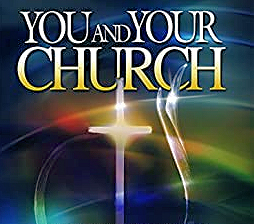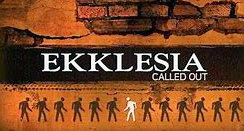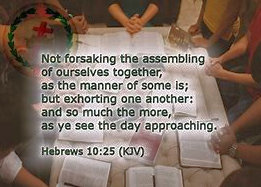You and Your Church

Introduction: –
The Christian walk and pathway is one that is fraught with many difficulties and problems, and simply because we know, Jesus Christ as our Saviour does not remove us from these things. In fact, the contrary is often true, hence the Bible typifies the roadway upon which the Christian travels as a “narrow road” but with the wonderful promise about it, being that it leads on unto eternal life.
On the road however, and as we travel, we can make life either easier or more difficult, and it can be fraught with considerably more dangers and pitfalls, than we should be experiencing, simply because we are not, or choose not to follow, in a precise manner, the “road map”, that God has given to us, namely the Bible.
It is all too easy, in the enthusiasm of our hearts, and in an attitude of love to the saviour, to find ourselves, both inadvertently going astray and losing our way, and also being deliberately led astray, by the enemy of our souls, using the enthusiasm and love we have, against us, and it is well to remember that the Bible tells us in “Proverbs 14:12” – “There is a way that seems right unto a man, but the ends thereof are the ways of death”, and the last thing we want, as God’s People is to find ourselves, entering into spiritual poverty and desert experiences, simply because we have failed to go God’s way.
So what as Christians, can we and should we do, in order to prevent these things from happening, well essentially what prevents both of these things occurring, is following the ”road map” clearly and precisely, but also at the same time, learning how to decipher and understand the map correctly.
This was a particular area of ministry that the Apostles in the New Testament gave themselves to, and which over the pages we are going to apply ourselves to, and in the particular context, of the Local Church and how we function and operate within it, and also what our responsibilities, as the children of God, are to the Church Universal, and the Local Church with it’ s member is.
There are some tremendous misconceptions held in regard to the Church, and whilst it is not my intention in this study to examine these, I trust that as we study together, we will discover that the Holy Spirit will “open the eyes of our understanding” – “Ephesians 1:18” and also remove any of the “myths, traditions and misconceptions” that we have held, and thus set us free.
There is an old saying that speaks like this “The first requirement of a good and quiet funeral is a willing corpse”, and I remind us of this because over the recent years analysts of the contemporary scene have been saying that the Church is dying and they have been sounding it’s “death knell” as an institution in the world, and one prominent Canadian Bishop along with many other liberal theologians has said that the church would not last another decade, yet the evidence all over the world, quite clearly shows that it is not a “willing corpse”.
In the United States there are more than 126 million people who are church members, and throughout many parts of the world Evangelical and Non-Conformist Churches are springing up rapidly, and even in places where belief in Jesus Christ and Worship are outlawed, such as behind the “bamboo curtain” and until recently the “Iron curtain”, the church is growing, by leaps and bounds.
Yes! it is a fact, that contrary to the views of many, the church of Jesus Christ is strong and healthy and getting more and more so, and for those who read their Bible’s this really comes as no great surprise, because the words of Jesus are. “I will build my church and the gates of hell will not prevail against it” – “Matthew 16:18” we do not need, as God’s people to defend the Church, Jesus and the Holy Spirit, are quite capable of that on their own, but we do need to discover our place and function within it, and we need to learn how to operate within the confines of a “Local Community” of God’s people and how to relate to one another.
It was never God’s intention, and never shall be, that Christians live and work for Him on the their own, the Bible tells us clearly that “He takes the solitary and puts them in families” – “Psalm 68:6”, and it is in those specific families of God’s people, that we live and operate and function for the Lord Jesus. Truly we are the “Body of Christ”, and we need to learn the reality of those words, if we are to ever, and before we can ever move on into maturity in the Christian life.
 When one takes time to consider the early chapters of the Book of Revelation we there discover the Apostle John absolutely dumbfounded by the revelation he received, of the Church of Jesus Christ and of the Lord Jesus Himself and it is with the tenderest of words that Jesus says to him in the midst of his fear “fear not” – “Revelation 1:19”, and I do not believe that it is without significance that the Lord Jesus, in His desire to reveal such breath-taking visions to John of the future, that He commences with a guided tour and discussion relating to seven individual local churches, speaking of their problems and pains, and their unique and individual joys and fears.
When one takes time to consider the early chapters of the Book of Revelation we there discover the Apostle John absolutely dumbfounded by the revelation he received, of the Church of Jesus Christ and of the Lord Jesus Himself and it is with the tenderest of words that Jesus says to him in the midst of his fear “fear not” – “Revelation 1:19”, and I do not believe that it is without significance that the Lord Jesus, in His desire to reveal such breath-taking visions to John of the future, that He commences with a guided tour and discussion relating to seven individual local churches, speaking of their problems and pains, and their unique and individual joys and fears.
It is the habit with some in the Christian Church to consider that the Lord is only interested in His Church Universal and that the “Local Church” has no place of “special affection” in His heart, but this is entirely wrong.
In the revelation that John was given we see Jesus knowing each individual lampstand intimately. He is seen to notice Apathy and Steadfastness, He Encourages some and Warns others, and as a group of God’s people we must never forget the tremendous importance that God places upon the place of the Local Church in the life, growth, and maturity of the individual Christian . The local church is to be honoured and cherished in the thinking of the believer.
Jesus as Lord of His Church is seen continually to be concerned with the life, health and atmosphere of each and every local gathering of God’s people, and we need to stop and consider how much the Lord Jesus loves the local church in which He has placed you and I, and then to ask ourselves if our own attitude reflects that of Jesus. “Do we love our church or merely attend it?”. The chief desire of the Lord of the Church, Jesus Christ is that it might be seen to prosper, and that His glory be reflected in every aspect, and that it be a place of fruitful service by His people.
 There are many Christians who out of a number of reasons and by varying means draw back from both membership and commitment to the works and endeavour of a local fellowship of God’s people, and they make all sorts of excuses as to why they need not belong, however none, and again I will repeat than none of them have any foundation in scripture and nor will they ever have.
There are many Christians who out of a number of reasons and by varying means draw back from both membership and commitment to the works and endeavour of a local fellowship of God’s people, and they make all sorts of excuses as to why they need not belong, however none, and again I will repeat than none of them have any foundation in scripture and nor will they ever have.
The local Church is constantly under attack by the devil, he would try to “sift as wheat” every believer if he could, and his great desire is to attack relationships, sow seeds of doubt and mistrust; he endeavours to distort our perspective of one another: and to try and make us peel off into loneliness. He warns some to keep their distance and just attend, lest they get hurt or offended, and wherever he can he causes hurts and offenses in order that others will separate themselves from the group of God’s children and once again become orphans in the cold.
In every single case that I have met, and I don’t for one moment suppose it will ever be different, where this happens the individual becomes Cold, Lifeless and Critical, and certainly whilst there might be much activity in their life to fill the sense of emptiness, there certainly is no lasting fruit.
In the New Testament it was considered to be a “grave punishment” if persons were isolated from the local church, unfortunately today, it is tragic that many punish themselves by doing so. Clinging to their various fears and differing grievances they become vulnerable to the devil’s attack, and they become increasingly ineffectual in Kingdom building.
There are those who have given up on the local church by remaining individualistic in their attitude, they will do things “their way, and in their time” and thus pour their many talents, energies and aspirations into their own activities, but invariably when they, if they honestly look at their work, as others do, they see that there is no real lasting fruit.
Mere “church going” was never, and never will be God’s plan for His children, He has made us with the need for close relationships, His desire is that we “bear one another’s burdens” and that we “provoke one another unto good works” that we “cry and rejoice with one another”, and all this requires that we live close to each other in trust, being “joined and held together so that we can build up one another in love” – “Ephesians 4:16”.
We are going to examine three aspects in this study together: –
- The Church Universal
- The Church Universal Triumphant and Militant.
- The Church Universals Local Organisation
- Our Relationship towards the Church
The Church Universal
In “Nowell’ s Catechism” the Church Universal is described as “The Church is the universal society of all the faithful whom God has predestinated from eternity to everlasting Life”, and with this description, I do not believe we can find any fault, but a more detailed manner of describing it would be to say that the Church Universal is split into two categories, these being The Church Triumphant and the Church Militant.
The Church Triumphant constitutes those who have gone on before us into their rest in Jesus Christ and are awaiting us joining them, and the Church Militant is you and I, serving and living for the Lord, here and now.
We could in many respects also divide the distinction even more by saying that there are two further divisions, The Church Visible and the Church Invisible, the Church Visible being the actual ecclesiastically organised Church as an organisation, containing both Christian and Non-Christian alike, and the Church Invisible, which is made up of only those who truly know Jesus Christ as their Saviour and who have their names written in the “Lamb’s book of life”, and this involves, past, present, and future.
The Greek word for Church is “ekklésia” – an assembly, a (religious) congregation the original word: -ἐκκλησία, ας, ἡ – and it is literally used in the context of citizens “summoned together or called out”, and in context in which we are looking at it “summoned together as the sovereign assembly” of God’s people. In the New Testament it is well to remember that this term is not ever used in the context of a building, but only ever in regard to a Local Community of People.
We therefore understand that the Church is not made up of “bricks and mortar” is not some great edifice, or cathedral, it is not an organisation, but a living, breathing organism, vibrant with God’s life and energy, and one that cannot be limited to the day and generation in which we live, but in essence goes back to the earliest of days, and goes forward into the future, terminating at the Coming of Christ, and the conclusion of the Dispensation of Grace in which we live today.
In this context therefore we should consider the purpose of the Church, and I will not at this time go into this at any length but merely state that the Church is a company of redeemed men and women, who meet together for a common worship of God and for mutual edification.
The underlying idea is that of fellowship, as is illustrated through the illustrations given of the church as a Body, and of a building made up of compacted stones. It is to be a place of witness, through which the Gospel of Jesus Christ is proclaimed and also preserved, and it exists to make Christ real to a lost and dying world.
A justifiable question could and really should arise here, and the question is “When did the Church, as we know it begin?”. Well! the actual moment of its conception was long after God’s intention, He had fore-ordained for the Church to exist long before it actually did, and the words of Jesus “I will build my Church” – “Matthew 16:18” looks forward to a future event, the moment of its birth is discovered in “John 20:22” where it says “He breathed on them, and saith unto them, Receive the Holy Ghost”.
Now this may seem a surprise to some and it is well that I take the opportunity to explain further. It is a fact that the Church is made up of redeemed sinners who are born again through the death of Jesus Christ at Calvary, it therefore follows that until the Death and the Resurrection of Jesus Christ, the experience of being “Born Again” could not be had, and if the Church is made up of those that are born again, until a certain point had been reached after the resurrection of Jesus, being born again was not possible.
The significant word to take note of is the word breathed it’s a Greek word “emphusaó” – to breathe into or upon the original word ἐμφυσάω and it is only used once in the entire New Testament and it is the Greek equivalent to the Hebrew word “naphach” – to breathe, blow upon original word נָפַח used in “Genesis 2:7” where it is used to indicate the giving of life into the lifeless clay model of Adam.
When God breathed into Adam “he became a living soul” – “Genesis 2:7” and when Jesus breathed into the disciples in “John 20:22” they became living souls, in the sense that they passed from death unto life. The Church began in a momentous way in “John 20:22” that was its conception, it’s actual coming forth as it were into existence, and being born and revealed is found even later, and we discover it in “Acts: 2”, the Church was conceived in John and Revealed in Acts and it was through the experience of the Day of Pentecost.
The Day of Pentecost was in fact a Jewish Feast Time, and Jews from many parts of the world would gather together to celebrate it, and it was at this time that Jesus told the “born again disciples” that they should gather together in the “Upper Room”, where they would be empowered for the Service and Work of God, as we see in “Acts 1:8” this they did, and we know that they were then Baptised in the Holy Spirit, which also shows to us that it was a unique and separate experience from the receiving of the Holy Spirit in “John 20:22”.
Now before we conclude this element of our study, I want to just mention one further thing, which is particularly pertinent to the Conception, Birth and Revelation of the Church of Jesus Christ, and it relates to the Keys of the Kingdom.
In “Matthew 16: 17-19” we read “Jesus answered and said unto him, blessed art thou, Simon Barjona: for flesh and blood has not revealed it unto you, but my Father which is in heaven. And I say also unto you, That thou art Peter, and upon this rock I will build my Church and the gates of Hell shall not prevail against it. And I will give unto you the KEYS OF THE KINGDOM OF HEAVEN: and whatsoever you shall bound on earth shall be bound in heaven: and whatsoever you shall loose on earth shall be loosed in heaven.”
The mention of Keys was familiar to the disciples because they were used to the Gates of Cities being opened with them, but none of them, and especially Peter could have realised the significance of these Keys that he was being given.
They were not real Keys in the real sense of the word, but Keys of Authority and Opportunity, in which Peter would open the scope of the Gospel and fling open wide the Gates of Life to all men everywhere .
The 1st use of the Keys was on the Day of Pentecost when Peter stood up in the midst of the disciples and preached, and 3000 were converted to Jesus Christ, the 2nd use of the Keys was in “Acts 8: 14-19” where Peter preaches to the Samaritans, a people hated by the Jews, but now baptised in the Holy Ghost, and the barriers broken down. The 3rd use of the Keys is found in “Acts10: 44-4 8” where Peter is speaking to the Gentiles about Jesus and as he is, they also are baptised in the Holy Ghost .
There are therefore 3 times when the Keys are used, to the Jews, to the Samaritans and to the Gentiles, therefore removing forever all barriers to all men everywhere, and thus making the Gospel Universally the means of Salvation, to all tribes and nations .
The Purpose of the Church of Jesus Christ
In a previous section of the study we used the phrase relating to the Church Universal of a building made up of compacted stones. In reality that is what the Church of Jesus is. However, at the same time we need to recognise, that the Church of Christ has a specific, profound and gloriously honouring role to fulfil and it is “to be the centre of witness, through which the Gospel is to be preserved and propagated to all men. The ministration of the Gospel has not been given to angelic beings, but to the Church, and thus the spreading of the Gospel is its first priority, and it exists to make Jesus Christ real to a lost world.
If we have given our lives to Jesus Christ, whilst it is important that we maintain our spiritual glow, it is also important to recognise, that if we do not ever attempt to win the lost, then we are living in direct contradiction to the plan, purpose and will of God in our lives .
Only out of obedience to the commission of Jesus Christ as found in “Mark 16:15” – “Go ye into all the world and preach the Gospel” can we ever hope to live a pleasing life to Jesus Christ and know of the fullness of His blessing upon us .
The Nature of the Church of Jesus Christ
I have mentioned already that the Church should not be considered in any way as the “bricks and mortar” in which we gather together, and that it is not an Organisation but in fact an Organism, which is alive and vibrant with the life of Christ .
You will I’m sure have noticed when reading the Old Testament Scriptures regarding the Jewish Church that in the. A study of the New Testament in regard to the Local and Universal Church shows very clearly that the items laid down were to be respected as principles as opposed to rules. The distinguishing feature of the Church in the New Testament is that of simplicity and adaptability and that is exactly what it should be today .
In the writings of the New Testament always the emphasis is placed upon the “hidden life” which we all have with Jesus, and the “outward manifestation” of that life seen in a determination to perform the both the Will and Purpose of God.
The Scriptures do not say in vain “by their fruits shall you know them”, because our fruits, conversation and manner of behaviour will either betray or uphold our verbal testimony of life in Jesus.
The old saying “you can fool some of the people some of the time, but you cannot fool all of the people all of the time” is absolutely spot on in relationship to our walk in Christ.
We love to think, and invariably spend a considerable amount of time fooling ourselves in regard to our spirituality, but the plain fact remains, that what we are is what is seen, and not what we think we are, and we must therefore, when in fellowship in the Local Church situation be open to our brethren, appointed by God, for them to share with us those things, seen and beheld by all.
The Characteristics of the Church of Jesus Christ
I am not proposing to go into any great detail regarding this particular aspect, and I will really only itemise the four particular tenants of the Church in regard to its characteristics: –
- Unity.
- Sanctity.
- Catholicity.
- Apostolicity.
The Church is One because it is united to Christ, it is Holy because the Spirit of God possess it.
The Church is Catholic because it is proclaimed everywhere and its life is independent of place or time, and Apostolic because it is true to the New Testament Apostolic teaching.
The Local Church
We have already mentioned the fact although in other words that it is not to be considered normal for a person who professes to be a follow of Jesus Christ to (live to him or herself), and it is not possible to express in strong enough terms the risk of serious loss that the Christian faces who has no time for his or her “spiritual home” and make no mistake about it, every Child of God, has a spiritual home. God does not have any orphans, when Jesus saves, His Father immediately places His new Child into a home, in which he or she can receive Love, Nurturing and Guidance, and through it find support .
It is “pride” of the worst sort and only that which keeps a Christian from a spiritual home, and so in light of that, and the things we have already considered together, we do well now to turn our attention from the Church Universal and to the Local Church, and to see: –
- What is the way we relate to the Local Church?
- What is the Authority of the Local Church over us?
- What our responsibilities towards the Local Church?
- What should take place in the Local Church?
The word Church occurs approximately 110 times in the New Testament, and on only 20 of these times it relates to the Church Universal, we therefore must conclude that, if so, much time is allocated to it, then it must figure very highly within God’s thinking, and in the importance that the Holy Spirit would have for it in our own thinking.
The Importance of the Local Church in the Book of Acts
The Book of Acts was written in all probability by the disciple of Jesus Luke. In about 63 A.D. and its purpose was to give all future generations a record of the Birth of the Church, and how it conducted itself.
It begins by telling us of the events on the Day of Pentecost, which we have already considered, it tells us of the 3000 converted to Jesus Christ, and what I want you in particular to notice here is that the 3000 quickly banded together in their communities into local fellowships and were also Baptised in Water, read with me what is found in “Acts 2: 41-42” – “then they that gladly received His word were baptised; and the same day were added unto them, about 3000 souls, and they continued steadfastly, in the Apostles doctrine and fellowship, and in breaking of bread and prayers”.
You will immediately notice that four things in particular were involved in the life of the new convert, and I feel it is important item to mention here that there seems to be no hint that immediately being involved a and being wholehearted was not in any way a surprising matter.
The four things were: –
- The Apostle Doctrine i.e. – Bible Study.
- Fellowship.
- Breaking of Bread i.e. – Communion.
- Prayers i.e. – The Prayer Meeting.
To survey the whole book would be too long a business for a study such as this, but there are references which show how the Local Church grew in importance in “Acts 6:1-8” – Acts 11:26-30 – Acts 13:1-5” the Local Church is seen to participate in Social Activities, N.B. – amongst its own members, providing in particular Financial Help where required .
The Apostle Paul did not consider that his missionary work and evangelism was complete until the converts were meeting on a regular basis, and as “Acts 14:23” says “Elders had been appointed in every Church”.
The Testimony of the Epistles
The Epistles were inspired letters sent by the Apostles to Local Congregations of believers, and contained explicit instructions in regard to the daily details of the life and conduct of the Local Church in regard to Discipline and the Lord’s Table in any given area, and they also gave the duties of Elders and Deacons.
It is very obvious from the writers and particularly the Apostle Paul who authored most of the epistles that he held the local Church in the highest of esteem and honour, an example of this is seen in the way he rebuked the Corinthian believers in “1 Corinthians 11:22” where he said “Despise ye the Church of God” note he didn’t get into the particular area of fault especially, it was the effect that the fault had on the local community of believers that was of the prime importance. Again, we see in the writings of Paul in “1 Timothy 3:15” when he is writing to his friend Timothy who had just become the Pastor of a Church, he writes informing him of how the Church life should be conducted.
The Command in Hebrews
The author of the book of Hebrews is unknown, but the book reveals to us that the Christians, who were previously Jewish believers were finding themselves getting into bondage over the Jewish Traditions.
We find Paul’s words of importance in the context of our study together in “Hebrews 10:25” where it says … “Not forsaking the assembling of yourselves together, as the manner of some is, but exhorting one another and so much the more, as ye see the day approaching” these are familiar words to us, I’m sure, and Paul was exhorting the believers to recognise their Christian Duty and Responsibility. They had become slack in their attendance, perhaps due to persecution or discouragement, but whatever the cause it was certainly contrary to God’s Will in their lives.
We should recognise that as the Children of God, whilst we can enjoy all the blessings of God, and revel in His Love, and particularly enjoy His presence and provision in our lives, we also with those blessings have responsibilities.
We are responsible to one another as we have already seen, but also to the Lord, and we should primarily out of (Devotion) to the Lord give God’s House a position of priority in our daily lives, but even if it is not through (Devotion) but out of sheer duty that we attend, we should still attend .
It could be said “Oh! if I attend only out off duty, then there is not much point in my being there!” and one can see the point of that, but if we all said the same, and during periods when things were not going well, or we are facing difficulties, or going through a hard time, or didn’t feel like it, decided not to attend, then for the most part the services would be scantily attended at best, because we suffer from those things every day in our lives.
The Importance of the Local Church to You
I hope that by now we are left in no doubt relating to the importance that is placed upon the Local Church and the Vital Part it obviously has in the plan of God for each of His children, but let’s now turn to the importance that the Local Church has to play in the Individual Life of you and me.
The 2 spheres of Importance which we will centre our thoughts upon are: –
- Instruction.
- Place of Service.
because in reality these two areas encompass all the activities that take place in any Local Church.
The Local Church as the Place of Instruction
What is the very first thing we discover after the three thousand got saved on the Day of Pentecost? Yes! That’s right, they immediately got involved in Instruction, and it is clear to see that the Local Church is to be seen as the Centre of Bible Teaching. Its not the opinions and biases of charismatic leaders, not the passing fads and concepts of leaders in large Churches and Organisations, but plainly and simply God’s Word the Bible.
 The Bible is to be the “plumb line” against which we measure and examine all other teaching, and if teaching is not found to be in accordance with the Scriptural Bible Teaching it is to be disregarded.
The Bible is to be the “plumb line” against which we measure and examine all other teaching, and if teaching is not found to be in accordance with the Scriptural Bible Teaching it is to be disregarded.
There are many in Christendom who hold the opinion that “they can learn equally well at home” that the Holy Spirit teaches them all that they need to know” and that “they understand by divine inspiration”. Well! all I can really say to that initially is that with careful examination of their lives, it is obvious to all but themselves, that they are living in a fantasy world all of the their own falling prey to all sorts of fads and strange ways of behaviour.
The Local Church was ordained to be a place of Instruction, not that the Instruction should not be “tested and examined” because no one is infallible, but it is essentially the place where we all as God’s Children find our systematic and foundational doctrinal teaching in God’s Word.
The Apostle Paul exhorted Timothy in these words “Preach the Word, be diligent in season, out of season, reprove, rebuke, exhort with all long-suffering and doctrine” in “2 Timothy 4:2” and these methods are still God’s way today.
If a Christian believer ever asks you where they should attend Church, then the answer is simple, “Let God lead you, and go where the Bible is preached from cover to cover, and also where people try to live it out”.
The Local Church as a Place of Service
There are many of God’s Children who consider themselves as unable to offer anything to God in the way of service, this in the first instance makes a mockery of the Lord and His ability to work in our lives and in the second instance is really the cop out of the Christian who wants to sit back and enjoy but never contribute.
There are in fact lots of areas of Service in which we can minister to the Lord: –
- We Can Give – “1 Corinthians 16:2”
- We Can Evangelise – “Matthew 28:19-20”
- We Can Bear One Another’s Burdens – “Galatians 6:2”
- We Can Serve as Deacons and Elders – “1 Timothy 3:2”
and we could provide a greater list if required. It is a fact that the majority of Church Work is done by a very small minority of God’s People, and unfortunately many a Church has folded due to the pressures on so few, but there is no better place in which to serve the Lord than the local Church.
If any of us desire to be the servants of the Lord and we wish to work for Him, we need a spiritual home. No leader or minister or Church based organisation, that has any credibility will ever utilise those who are unable to find a Church Home or Work in their Local Church Community. If a person cannot work amongst those who Love, Care and Pray for them how can they ever hope to do some amongst strangers.
Gods Church – What Is It Like?
We have looked at quite a number of areas so far relating to the Church of Jesus Christ, and I want now to try and bring some thoughts that relate to what to look for in a Church, and there are three specific areas which I believe are the “tell-tale” signs of a healthy Church, and what should be constantly looked for.
- A Healthy Church will have Love for Jesus at its Heart.
- A Healthy Church is made up of those who are Fully Committed to Jesus and His Work.
- A Healthy Church is where a Christian Commitment is Seen to be Outworked.
The Power of the Church
We recognise from a mere scant reading of God’s Word that Jesus Christ is the Founder and Architect of His Church, but we should also recognise the fact that at the same time as pioneering it He also provided it with all the required power and authority it may require.
When Jesus is spoken of as being the Head of His Church, we should acknowledge that this is two edged, in that it is not only in the realm of the “Organism” of the Church that He is Head but also in the area of “Administration”.
Jesus Christ has clothed His Church as King of Kings with His power and authority, and with His ability to rule and reign, and to do so in this life, now.
In the beginning when the Church came into being the Apostles were vested with a “special authority” to lead and guide the young and growing Kingdom of God’s People into strength and maturity, but do not let us for one moment convince ourselves that the power rested only in them.
In a unique way, they were to bring the budding Church into maturity but this was a “special and short lived” area of ministry, and whilst there are still Apostles today, those that are obviously God ordained, do not have exactly the same area of ministry that the twelve had, at the time the Church started.
Let me explain a little further for you, in the early days of the Church, the Word of God was being imparted to the Apostles, in order that they could provide a “bedrock” of Doctrine upon which the Church would be founded, no Apostle since that time has ever been, nor ever will be called upon to enter that area of Ministry.
Also, in the area of “The Keys of the Kingdom” this specific area of Power and Authority was Peter’s, and used only on the occasions we have already spoken of to open the Gospel to those who ordinarily would never have received it.
It is a fact now that the whole of the Church of Jesus has power vested in it, but whilst we recognise that to be a reality of Scripture, we must also at the same time recognise that God has set ORDER in His Church “1 Corinthians 14:33” says “For God is not the author of confusion, but of peace, as in all churches of the saints”, and it is through the ORDERED means that His Church is Governed, with God given power and authority, and the power of God is seen in this context of the Church of Jesus in two ways, and they are SPIRITUAL and MINISTERIAL .
It is SPIRITUAL in that it is given by the Holy Spirit “Acts 20:28” and can only be exercised in the name of Jesus and by the power of the Holy Spirit – “John 20:22-23” and in “1 Corinthians 5:4” it is applicable especially to believers in Jesus – “1 Corinthians 5:12” and it can only be outworked in a moral and spiritual manner – “2 Corinthians 10:4”.
The State represents the government of God over the outward and temporal state of man, while the Church represents His government in the inward and spiritual state. The former aims at assuring its subjects of the possession and enjoyment of their external and civil rights, and at times has to exert a coercive power to do so, whilst the Church of Jesus is founded upon its opposition to an “evil spirit” and is out worked in the delivering of men from spiritual bondage by imparting to them the knowledge of the truth .
The Kingdom of God and the Power of the Church is not as the State, manifest in Force in the physical, but spiritual.
It is MINISTERIAL in that in God’s ORDER He has already established Men in places of Authority in His
Church, by both an INWARD and OUTWARD CALLING, to under Jesus Christ, rule the Church, and these fulfil for the Church Universal the Ministry Gifts of “ Ephesians 4” and the Local Church positions of Elders and Deacons.
In both instances the power is exercised in harmony with God’s Word and under the direction of the Holy Spirit, and is very comprehensive in that it covers the Administration of God’s Word and the Sacraments “Matthew 28:19” the determining of what is and what is not permitted in the Kingdom of God “Matthew 16:19” the forgiving and retaining of sin “John 20:23” and the exercise of Discipline in the Church as a whole.
Church Discipline
In the realm of discipline that is being spoken it would serve us well at this point to examine this a little closer.
It is a fact that the Holy Spirit is striving constantly to bring about a holiness of life and behaviour in the Child of God, and one that is based, not on Human and Earthly estimations and considerations, but those based on God’s Word, and God’s Word alone.
We can never hope to be successful in the performance of the Will of God or fruitful in our individual lives, or victorious if our lives are not measured against the plumb line of Scripture.
God’s Will is that “If we love Him we keep His commandments” the tendency however, if we are not careful in the Church of Jesus, in this modern age in which we live is to “do everything that is right in our own eyes” – “Proverbs 21:2”, this however is not God’s way.
There is a noticeable lack of discipline in the Church of God in many places, and whilst we recognise that the conversion and reformation of the sinner is part of the commission of Jesus, and we are trying to draw them into the Church, at the same time we must also remember that we are first and foremost an assembly of SAINTS, and deliberate, defiant and continuing sin cannot be allowed or tolerated.
The area of Church Discipline is dealt with over a considerable amount of Scriptures, and because of that we must therefore acknowledge that it is an important area of God’s Word to understand, and I list a number of references for further study purposes which will provide further enhancement of our knowledge – “1 Corinthians 5:2-7-13” – “2 Corinthians 2:5-7” – “2 Thessalonians 3:14-15” – “1 Timothy 1:20” – “Titus 3:10”, in each of these there a various facets of things that require discipline.
There are two areas of discipline, one is of the Private Nature, and it is really in the beginning a Personal Disciplining, as suggested from “Matthew 18:15-17”, if a brother or a sister wrongs you, then they should be admonished, and if this is unsuccessful that the Church Leaders are to deal with it, notifying the Church and taking the matter in hand, it should however be recognised that this is for PRIVATE SINS, not PUBLIC, when it encompasses PUBLIC SINS then these are dealt with in quite a different manner.
In “1 Corinthians 5:1” Paul rebuked the Church because sin of a Public Nature was seen, and not dealt with, and in “Revelation 2:14-15-20” the Churches of Pergamos and Thyatira were rebuked because they did not exclude heretical teachers from their midst .
Public Sins, must be dealt with, or the Church of Jesus Christ will fall into disrepute, initially Scripture reveals that BARRING the Individuals from the Communion Table, is the first step to be taken, and is carried out as a private procedure, if this fails to bring them to repentance, then the Sin is revealed to the congregation of God’s People as a Whole, with admonitions to repent, and the final stage is excommunication from the Church “Matthew 18:17” – “1 Corinthians 5:13” – “Titus 3:10-11” , but at all times it should be remembered that apart from maintaining holiness in God’s People, the other reason is to bring the Brother or Sister back into fellowship “1:CORINTHIANS:5:5”.
The Church and the Means of Grace
The Bible very clearly speaks to us regarding the mission of the lord Jesus when He came here to Earth, and one particular Scripture which reveals it is “2 Corinthians 5:19” God was in Christ reconciling the world unto Himself” and today here in this place we are evidence of the fulfilment of this mission of Jesus.
The task of Jesus was to bring about a oneness with God Almighty through His death on the Cross of Calvary, it says in “Colossians 1:22-22” – “…. and you that were once alienated and enemies in your mind by wicked works, yet now hath He reconciled, in the body of His flesh through death, to present you holy and unblameable and unreproveable in His sight” and it is upon this basis of presentation that the Holy Spirit is continually outworking the will of God in our lives. It is by the work of the Holy Spirit, and in particular our openness and willingness to respond to Him, that the work of Christ will successful and pleasing to His Father and in this life and ultimately the life to come, filled with richness and fulfilment.
The early Church had learned this lesson, that is why they bore the testimony of those around about them in the secular world “turned the world upside down” – “Acts 17:6” but there was also another thing that was specifically noticed about them and it was said of them as an accolade “see how they love one another” .
In a world which was characterised by brutality, murder, immorality, violence, graft, bribery and both natural sexual activity and child abuse was rife, very much like our own world today. These Christians who had banded together stood out like a light in a dark place, and in stark contrast. The Bible says to us “In the same way, let your light shine before others, that they may see your good deeds and glorify your Father in heaven” – “Matthew 5:16”
We spoke earlier regarding the command in Hebrews relating to the forsaking of ourselves assembling together, and this has a particular relevance to God’s grace being (in and outworked) in our lives, and we are going to take a further look at this now.
What is meant technically by the term Means of Grace is all the various ordinances and ceremonies that the Children of God participate in and through which they receive His covenanted blessings.
In this modern society in which we live its all to easy to forget that God has laid down very clearly that through participation, individually and collectively of the areas we shall look at now that we receive His blessing and strength in our onward journey of faith.
The four areas are: –
- Prayer.
- Bible Reading.
- Worship.
- Sacraments.
Prayer
To the majority of the Christian Church today prayer would be understood in the terms of a means of deliverance from troubling and distressing experiences, a means of reactively dealing with circumstances that arise, but to merely see it in these terms, is to really underestimate it.
Prayer is by far the greatest means at our disposal and the chief “means of grace” that has been given to us, in order that we might know the Lord Jesus and relate to our Father. All the other means of grace are incomplete and will prove to be ineffectual in our lives, if this primary one is not entered into.
Prayer is primarily the free communion between the Soul and God, it is if you like simply spending time talking to Him, and it is the primary form of exercise that the Child of God enters into, that causes them to work and walk in accordance with the divine will.
It will be impossible for any person who claims to be a Christian to pray properly when they are dominated by self-will it was Jesus who said, “Let thy will he done and nevertheless, not my will but thine” – “Luke 22:42” and it is He who is characterised so much by the prayer times He had with His Father.
It is also a feature of prayer that when it is engaged in, we come to recognise and see God’s view of Jesus and His interests become ours.
Continually within the Word of God, we are exhorted to Pray, but it has been and unless we do something about it, will always be the “Cinderella” ministry of the local church.
If the Local Church of Jesus Christ is to be effectual and to take the enemies ground, in the locality in which it is planted, then it will be a definitive requirement of the Christians who are part of that fellowship in a community to Pray together, and to Pray through, and at times enter into warfare against principalities and powers .
It is a common and often seen aspect in all Churches that those who are in the most blessing, and knowing of God’s Provision and Walking strongly with the Lord, and suffering the least Problems in their Christian Lives are those who regularly Pray together with God’s People and also on their own.
It has been said that “Seven prayerless days makes One week” and it is absolutely true.
When, and it is a question we need to ask ourselves, did we take before the Lord in prayer for our Brothers and Sisters we are in fellowship with, day by day. In blessing others, we are guaranteed blessing in our lives, by impoverishing others by the neglect of prayer, we will become impoverished ourselves.
Bible Reading
I wonder if we recognise today that the Bible provides for us a full revelation of God, and that the Holy Spirit is continually wanting to reveal more of His Divine Character to us through the reading of it.
The Bible, and by the Bible I do mean the entire Old and New Testament, all 66 Books, is the entire revelation of God and His Will and Purpose, there is no other book or revelation, unless founded upon Scripture, upon which the Christian should base their lives.
Scripture is the “plumb line” against which we measure our decisions and attitudes, and therefore if we are to grow more into the likeness of Jesus Christ, if we are to know of His power and divine authority in our lives, and to see Him emulated in our attitudes, then it is imperative that God’s Word, and it’s reading and study, both privately and together in fellowship is entered into.
There is many a Christian who have become a castaway, and backslidden in their Christian Life, who can trace the cause back to failing to read God’s Word, and many a Christian whose life is confused and fouled up and in defeat, simply because even when they have read the Word, they have refused to adhere to it.
We were speaking of Prayer earlier and you will no doubt remember that when Jesus was led by the Holy Spirit into the wilderness, and He was tempted there, as He communed with His Father, that it was through the usage of Scripture that the enemy was set to flight. It is no different in the life of any Child of God. We in prayer use God’s Word, against the enemy, there is nothing more powerful in our armoury.
In this same context we must also mention the Ministry of God’s Word. It has been said, and rightly so, that “preaching is truth expressed through personality” and really that is spot on.
Those who are regularly engaged in preaching in whatever form that takes, must be immersed in Scripture and Prayer, in order that when they speak the Word of God, the right attitude is expressed, and in order that the appropriate truth for a given set of circumstances or situation is brought out clearly .
In this area, it is vital that the Church prays for those who minister the Word regularly, in order that God by the Holy Spirit can communicate through their personalities, that which He requires the Church to hear and obey.
Worship
We should be at all times a grateful people, recognising what God has given to us in Jesus Christ, and at the same time recognising God for whom He is.
There is a fundamental difference between Praise and Worship, Praise is centred upon thanking God for what He has done, whereas Worship is centred upon Who He is, and whilst the two are so often intermingled, we do at times need to discipline ourselves into one of the two areas.
It is all too easy for us in the midst of Praise and Worship, to find ourselves changing into Prayer, and instead of God receiving Praise or being adored for Who He is, we start bringing our “shopping list of requirements” to Him.
In the practical issues, we also need to think about Worship regarding our meetings together, it is important for us to recognise that whilst we do have our needs met in our gatherings together, and God does bless us, when we come together in a worship service we come primarily to GIVE not to RECEIVE, help me now to give you pleasure and delight is really the attitude we should be expressing.
How often do we come together, unprepared, late, expecting to gratify only our desire to feel good and to be lightened in our spirit? If we are honest, often this should not be the case – “1 Corinthians 14:26″ say’s the following “How is it then, brethren? when you come together, every one of you hath a psalm, hath a doctrine, hath a tongue, hath a revelation, hath an interpretation. Let all things be done unto edifying” and that expresses graphically the attitude we should have.
We should not expect at all times that the leader of the Worship Service is totally responsible for it, whilst there is a tremendous degree of responsibility on his or her shoulders, the materials they have to work on and with, are also equally important.
The Sacraments
In this we speak regarding the Table of the Lord, and it is a requirement, within the Will of God, that the true Christian participate in Communion.
It is not within the province of any Minister of the Gospel or any Church to forbid a Child of God partaking of communion, save in the case where Church Discipline, which we spoke of earlier, is imposed, and at the same time, Christians should be reminded, that Communion is not to be trifled with.
There are those in the Church of Jesus, who are literally continually sick in body, and some have prematurely died, due to their failure to recognise the importance of truthfully and honestly searching themselves before partaking, Ananias and Sapphira are prime examples.
It should be at the time of communion that the Church is at its most potency, with lives right in the sight of the Lord, enmities with brother’s and sister’s corrected, and all known sins dealt with. It is at such a time as this that the grace of God can flow in abundance.
The Future of the Church
The Church of Jesus Christ had a dramatic start, on the day of Pentecost, and in a similar manner it will have an even more dramatic ending, and we read of this in – “1 Thessalonians 4:16-17” – “….For the Lord Himself shall descend from Heaven with a shout, with the voice of the Archangel, and with the trump of God; and the dead in Christ shall rise first; then we who are alive and remain shall be caught up together, with them in the clouds, to meet the Lord in the air, and so shall we ever be with the Lord” now that’s pretty dramatic I think, don’t you?.
It is after this event that the Seven Year Tribulation Period will commence, the Antichrist will appear, and we shall be enjoying the Marriage Supper of the Lamb, whilst the Jewish Nation enter the time prophetically spoken of as “Jacob’s Trouble” during the last 3.5 Years of the Tribulation.
At the end of the 7 Years, we will return with Jesus, and the time of the Millennium will be ushered in, where the Church of Jesus Christ will reign with Christ a 1000 Years.
Conclusion: –
It is our responsibility individually to find and know our place in the Body of Christ and having done so, serve the Lord in that capacity, and the people who are our brother’s and sister’s in the Lord Jesus Christ.











I am not only very joyful for these all aspects and details,but also I appraciated the way they have been clearly developed.Then, I want you to send me if possible,regularly these Bible studies.Thank you and be blessed!
Thank You John Claude – I would appreciate if if you could go to my YouTube Channel and Subscribe please. Thanks
I’m glad they were a blessing and hope they will bear fruit in your journey with our Master.
Please subscribe on the website and YouTube and you will automatically be informed of new content.
Bless You
Albert
Thank you very much for your very detailed and uncompromising study. You rightly and effectively challenge misunderstandings about the local church and very and remind us of how the Lord himself views the local church congregation. I was blessed in the reading of it!